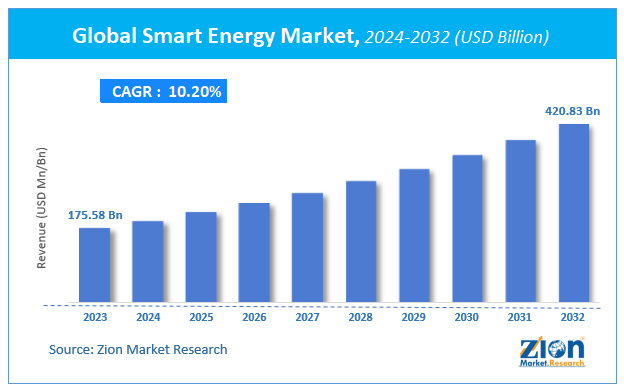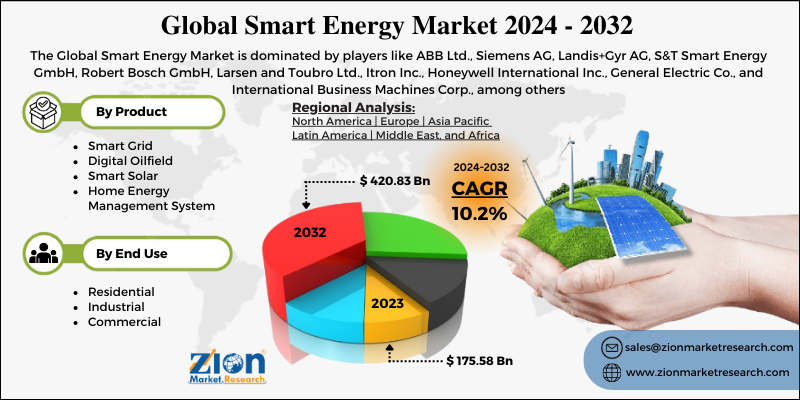Smart Energy Market Size, Share, Analysis, Trends, Growth, Forecast, 2032

Smart Energy Market by Product (Smart Grid, Digital Oilfield, Smart Solar and Home Energy Management System), by End Use (Residential, Industrial and Commercial): Global Industry Perspective, Comprehensive Analysis and Forecast, 2024-2032
| Market Size in 2023 | Market Forecast in 2032 | CAGR (in %) | Base Year |
|---|---|---|---|
| USD 175.58 Billion | USD 420.83 Billion | 10.2% | 2023 |
Smart Energy Market Insights
Zion Market Research has published a report on the global Smart Energy Market, estimating its value at USD 175.58 Billion in 2023, with projections indicating that it will reach USD 420.83 Billion by 2032. The market is expected to expand at a compound annual growth rate (CAGR) of 10.2% over the forecast period 2024-2032. The report explores the factors fueling market growth, the hitches that could hamper this expansion, and the opportunities that may arise in the Smart Energy Market industry. Additionally, it offers a detailed analysis of how these elements will affect market demand dynamics and market performance throughout the forecast period.
Smart Energy Market: Overview
Smart energy is nothing but a process of using devices for energy efficiency. It majorly focuses on sustainable and powerful renewable sources of energy that encourage eco-friendliness and minimize costs. It integrates different energy infrastructures and has the potential to serve a wide range of end-users. Smart energy is a cost-effective, sustainable, and secure energy system, which focuses on sustainable energy production while reducing the production cost.
Smart Energy Market: Growth Factors
The global smart energy market is growing at an exponential rate. The smart energy systems allow the user to match supply & demand and integrate more renewable sources of energy including solar and wind into the system. This allows creating energy to emit less carbon dioxide into the atmosphere and make less pollution. The increase in environmental concerns, the growing necessity for renewable energy sources, and growing investments in smart energy systems are a number of crucial factors that are primarily spurring the expansion of the worldwide market. Additionally, there's an enormous investment in smart grid technology as several benefits are related to it. This includes lower peak demand, which aids in lower electricity rates, and many more.
Smart Energy Market: Segmentation
Product Segment Analysis Preview
The smart grid segment held a share of over 34 % in 2023. The smart grid accounts for a sizable portion of revenue. A smart grid is an electricity network/grid that allows for a two-way flow of electricity and data, with smart metering being a common first step. This is due to an increase in demand for dynamic or real-time pricing, as well as the use of distributed energy systems in both residential and commercial settings.
End Use Segment Analysis Preview
Due to a surge in demand for smart energy in energy-intensive industrial sectors, where the smart energy system helps to decrease energy costs and improve the company's ecological profile, and feedback scheduling, the industrial sector accounted for the biggest revenue share and market growth.
Smart Energy Market: Report Scope
| Report Attributes | Report Details |
|---|---|
| Report Name | Smart Energy Market |
| Market Size in 2023 | USD 175.58 Billion |
| Market Forecast in 2032 | USD 420.83 Billion |
| Growth Rate | CAGR of 10.2% |
| Number of Pages | 120 |
| Key Companies Covered | ABB Ltd., Siemens AG, Landis+Gyr AG, S&T Smart Energy GmbH, Robert Bosch GmbH, Larsen and Toubro Ltd., Itron Inc., Honeywell International Inc., General Electric Co., and International Business Machines Corp., among others. |
| Segments Covered | By Product, By End-User, And By Region |
| Regions Covered | North America, Europe, Asia Pacific (APAC), Latin America, Middle East, and Africa (MEA) |
| Base Year | 2023 |
| Historical Year | 2018 to 2022 |
| Forecast Year | 2024 - 2032 |
| Customization Scope | Avail customized purchase options to meet your exact research needs. Request For Customization |
Regional Analysis Preview
The North American region is projected to grow at a CAGR of 9.1 % over the forecast period. The presence of a large number of market players is also going to contribute significantly to the growth of the smart energy market in the region. North America is a technologically advanced region, which means the adoption rate of any new technology is very high in the region. During the forecast period, North America is expected to lead the worldwide smart energy market and account for the largest revenue share. Though the majority of organizations have already recognized the need for the smart energy market and are using the same as well. The existence of advanced technology, increased investments in smart grid technology, and growing worries about carbon emissions are all factors contributing to the market's growth in this region.
Asia Pacific is expected to be growing significantly in the smart energy market. The developing region has witnessed a rise in the usage of technology. As the population here becomes more aware of the need to adopt smart energy, the demand for smart energy will be boosted over the next few years. Also, awareness of the government towards technological advancement will add to the growth of the market in the region. This is due to the increasing use of smart energy gadgets, a shift toward renewable energy sources, and increased environmental concerns.
Smart Energy Market: Competitive Landscape
Some of the key players in the smart energy market are
- ABB Ltd.
- Siemens AG
- Landis+Gyr AG
- S&T Smart Energy GmbH
- Robert Bosch GmbH
- Larsen and Toubro Ltd.
- Itron Inc.
- Honeywell International Inc.
- General Electric Co.
- International Business Machines Corp.
- among others.
These companies adopt various strategies in order to boost their presence and capitalization.
The smart energy market is segmented as follows:
By Product
- Smart Grid
- Digital Oilfield
- Smart Solar
- Home Energy Management System
By End Use
- Residential
- Industrial
- Commercial
By Region
- North America
- The U.S.
- Canada
- Europe
- France
- The UK
- Spain
- Germany
- Italy
- Rest of Europe
- Asia Pacific
- China
- Japan
- India
- South Korea
- Southeast Asia
- Rest of Asia Pacific
- Latin America
- Brazil
- Mexico
- Rest of Latin America
- Middle East & Africa
- GCC
- South Africa
- Rest of Middle East & Africa
Table Of Content
Methodology
FrequentlyAsked Questions
The smart energy market was valued at USD 175.58 Billion in 2023.
The smart energy market is expected to reach USD 420.83 Billion by 2032, growing at a CAGR of 10.2% between 2024 to 2032.
Some of the key factors driving the smart energy market growth are, increase in environmental concerns, growing necessity for renewable energy sources, and growing investments in smart energy systems are a number of the crucial factors that are primarily spurring the expansion of the worldwide market.
The North America region held a substantial share of the market in 2023. The existence of advanced technology, increased investments in smart grid technology, and growing worries about carbon emissions are all factors contributing to the market's growth in this region.
Some of the major companies operating in the smart energy market are ABB Ltd., Siemens AG, Landis+Gyr AG, S&T Smart Energy GmbH, Robert Bosch GmbH, Larsen and Toubro Ltd., Itron Inc., Honeywell International Inc., General Electric Co., and International Business Machines Corp., among others.
RelatedNews
HappyClients
Zion Market Research
Tel: +1 (302) 444-0166
USA/Canada Toll Free No.+1 (855) 465-4651
3rd Floor,
Mrunal Paradise, Opp Maharaja Hotel,
Pimple Gurav, Pune 411061,
Maharashtra, India
Phone No +91 7768 006 007, +91 7768 006 008
US OFFICE NO +1 (302) 444-0166
US/CAN TOLL FREE +1 (855) 465-4651
Email: sales@zionmarketresearch.com
We have secured system to process your transaction.
Our support available to help you 24 hours a day, five days a week.
Monday - Friday: 9AM - 6PM
Saturday - Sunday: Closed







